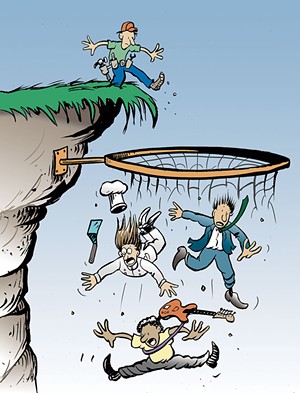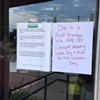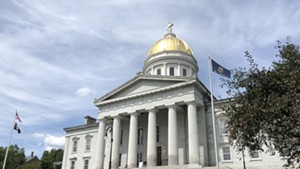About 9,000 Vermonters are due to lose all of their unemployment benefits this week as three federal programs that started during the pandemic draw to a close. Another 5,000 or so who remain on unemployment will lose a $300-per-week federal supplement to their checks.
Some employers expect to see job applications rise in response. But most expect the impact of the change to be small.
“It’s a lot more complicated than just this benefit,” Vermont Chamber of Commerce President Betsy Bishop said. She was referring to the federal programs that have paid millions to the self-employed and independent contractors since March 2020. The programs, the first-ever to provide such workers unemployment insurance benefits, ended Monday.
Even before the pandemic, Vermont businesses were having trouble finding workers, and it has become more difficult in the last year. Many restaurants have signs up saying they're limiting their hours or closing on some days because they don't have enough workers.
The Vermont Chamber has been studying the workforce for years through its Vermont Futures Project. The state reported that about 30,000 people left the Vermont workforce during the pandemic, 10,000 of whom have retired, according to Bishop.
It’s less clear what the other 20,000 are doing, “but we know through anecdotes that people have used that time to make a lifestyle change,” Bishop said. Some have left their retail or restaurant jobs for other pursuits; others have sought training. Many want to go to work but cannot find childcare, she said, and some are staying home to mitigate the risk of contracting COVID-19.
“All of those things create a very complex decision tree for each person,” Bishop said.
For Sacha Smith, the Vermont manager for the CorTech staffing agency, the childcare problems are playing out with the workers she has hired to help fill about 200 vacancies statewide.
One of her recruiters recently had to reduce her hours after her daycare, unable to find workers, started closing two days a week.
Smith thinks childcare issues are the biggest reason workers are staying away. The second biggest: the extra jobless benefits that started in the pandemic. Now that they’re ending, Smith said, she’s already seeing an uptick in applications. “We’re starting to get some interview requests,” she said.
CorTech is a national company based in Atlanta, and Smith said she sees the same staffing problems in other states.
“In some places, it’s even a little worse,” she said.
Some economists say ending the benefits will send more people into the job market, aiding the economy. About half of U.S. states, including New Hampshire, pulled out of the federal unemployment programs in May; the rest chose to let the benefits expire on Monday instead of applying for an extension.
Others say the loss of cash will hurt local economies and cause suffering for workers who have been hard-hit by pandemic job losses and changes.
“Those still filing for these benefits are the workers that need them the most, due to care responsibilities, health concerns, or other factors,” the
Economic Policy Institute, a Washington, D.C., think tank, reported in May under the headline: "There is no justification for cutting federal unemployment benefits."
But there's general agreement on one thing: Unemployment benefits are too low to substitute for a living wage. That's why in the first pandemic relief bill, Congress supplemented the benefits until July 2020 with a $600-a-week payment.
Last winter, some Vermont lawmakers discussed raising the weekly benefits permanently. That topic could come up again when the study committee on the unemployment insurance trust fund meets September 14, said Sen. Alison Clarkson (D-Windsor).
Like Bishop, Clarkson thinks unemployment benefits are just a small part of the labor picture in Vermont. The extra money isn’t enough to make a difference, she said.
“Peoples’ fantastical notions of how much money people make on unemployment is just untethered to reality,” noted Clarkson.
Without the $300 federal supplement, the maximum weekly benefit is a little over $500.
Even with the $300 supplement, “it’s not your full salary, so people are living in reduced circumstances," Clarkson said. She hopes to learn more about the impact of ending the federal supplements after the Department of Labor has collected unemployment data for the next month.
“We’re all going to be very interested in seeing what happens and what the numbers are,” she said.
The legislature this year passed a bill that included a $25 state unemployment supplemental benefit, due to start when the federal benefits ended. The $25 was limited to claimants with children.
But the state Department of Labor learned from the feds on September 1 that the benefit is not allowed and won't be offered.
“It’s unfortunate we are learning about it after the [state] law passed, but we must now adapt to ensure we comply with federal law,” Labor Commissioner Michael Harrington said in a statement announcing the news.

















Comments
Comments are closed.
From 2014-2020, Seven Days allowed readers to comment on all stories posted on our website. While we've appreciated the suggestions and insights, right now Seven Days is prioritizing our core mission — producing high-quality, responsible local journalism — over moderating online debates between readers.
To criticize, correct or praise our reporting, please send us a letter to the editor or send us a tip. We’ll check it out and report the results.
Online comments may return when we have better tech tools for managing them. Thanks for reading.